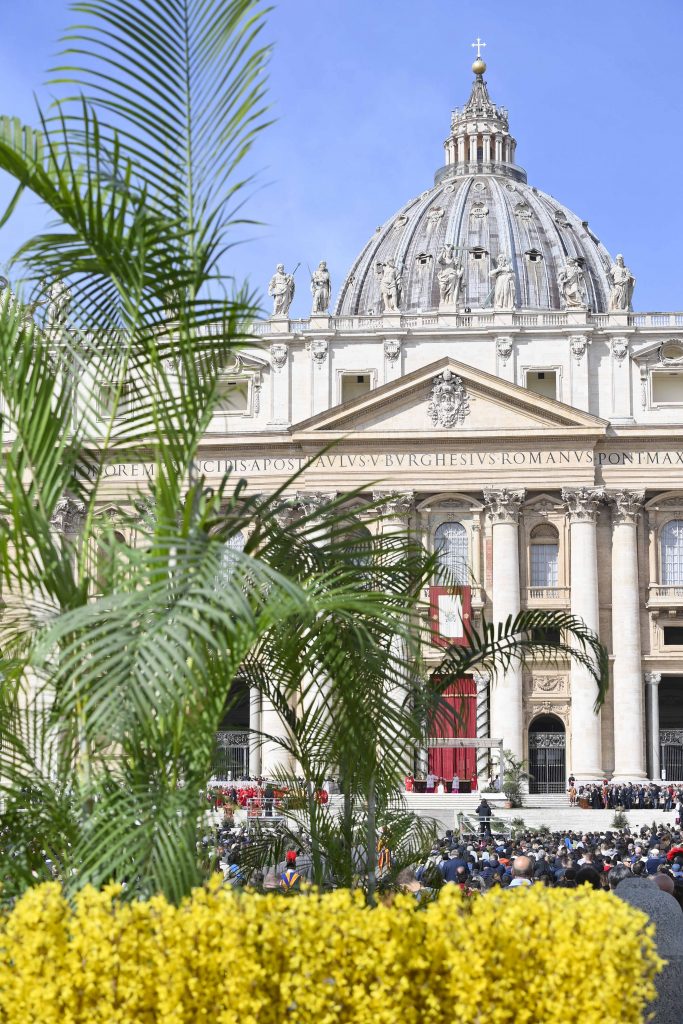
Palm branches stand in St. Peter’s Square at the Vatican as Pope Francis celebrated Palm Sunday Mass April 2, 2023. (CNS photo/Vatican Media)
Our Lenten journey began with the words: Turn away from sin and be faithful to the Gospel. The third Luminous mystery of the rosary sums it up well by saying Jesus came proclaiming the Good News and the conversion of life. Lenten is often referred to as the retreat of the Universal Church. With that in mind, let us turn to St. Ignatius for some guidance this Holy Week.
St. Ignatius of Loyola in the Spiritual Exercises asks the retreatant to reflect how the three Divine Persons when seeing that all of humanity in great blindness, lost as a result of their sins, going down to death, planned that the Son, Jesus would come to earth to save the human race. This is a good reflection for us during Holy Week, namely, to reflect upon the Divine Love that never leaves us alone in our sin; what is our response to such love? In moments when we are overcome with such knowledge that God’s love for us is personal and unconditional, we are like those who welcome Jesus into Jerusalem, wanting to make him King of our hearts, realizing that he is far more than an earthly king. In such moments we long to commit our life in loving service to the eternal King.
Secondly, we are wise to be honest about our sins and their consequence of death. Jesus looked at the reality of our sins from this perspective: In Mark, the scribes ask Jesus’ disciples why he eats with tax collectors and sinners. As Jesus sees us, that is the only option he has, to sit with sinners. We are all sinners. To this question, Jesus said: “I did not come to call the righteous, but sinners.” Romano Guardini explains this by saying that “Jesus does not exclude the just, but that there is no such thing. People who do not regard themselves as sinners are non-existent for salvation; or rather, for them salvation consists first of all, of admitting their sinfulness.” (The Lord, p. 148)
The passion and death of Jesus make it clear that we are reconciled with God not by our own effort, but solely by the selfless love of Jesus Christ, who poured out his life’s blood for the forgiveness of our sins. This is reality: we are created out of love, by God, and we are redeemed by the loving mercy of God’s Son, Jesus Christ. He who is Light has conquered our darkness. He who is Life has conquered death.
This Holy Week take time for two meditations. The first; take time with the help of the Holy Spirit to admit the sins that hold me back from a full life – the sins that threaten my eternal life. St. Ignatius offered two meditations to help with this. One is to sit in an empty, dark room, with the curtains drawn, to ‘feel’ the darkness of my sins. Or, to consider myself a great sinner bound with heavy chains going before a judge. This meditation is to be strictly personal – not about the sins of the world that nailed Jesus to the cross – but mine. The purpose of this meditation is to realize my need for a savior.
Second, in close association with the first meditation, is to ask for an intimate knowledge of the Lord, Jesus, “who taking the form of a slave, coming in human likeness; humbled himself to the point of death on a cross.” (Philippians 2:6-11) The point of this meditation is to grow in appreciation for all that Christ accomplished on my behalf in order that I may love him and follow him more closely.
This is the great fruit of Holy Week – to allow myself to be moved by the Passion of Christ to the point of conversion; to be moved by the love of God that my own life may be more and more a response of love. The grace of Holy Week is summed up nicely in our Opening Prayer for Mass:
Almighty God, who as an example of humility for the human race to follow caused our Savior to take flesh and submit to the Cross, graciously grant that we may heed his lesson of patient suffering and so merit a share in his Resurrection. Amen